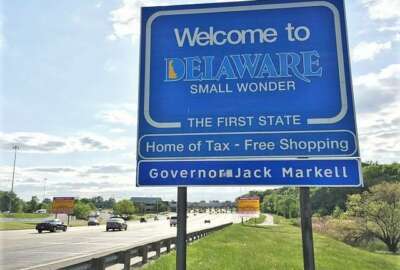
Want more income in retirement? Move
Feds more than most groups need to check on their tax status after retirement. That's why many move.
When they retire, many federal employees in Maryland move to Virginia for a lower state tax, or Delaware where there’s no sales tax.
Workers in Vermont move over to New Hampshire to become retirees, while for decades California-based retired feds have moved to Nevada or Washington state, which have no state taxes. For many years California tried to collect a “source tax” from them on the grounds that they had earned their salaries and annuities in California, had sent their kids to California-based schools, etc. It finally lost but it was a big deal for a long, long time.
Years ago a friend retired from his Virginia-based General Services Administration job to move to a small town on the Washington side of the Columbia River. Was he an outdoorsman, hunter or fisherman? Nope — he did it for tax reasons. He now lives in state tax-free Washington and shops across the river in Oregon, which has no sales tax. Was it worth it? He says yes.
So what about you? Have you thought about moving when you retire to hold on to more of your annuity? Nine states don’t have any personal or state tax: Alaska, Florida, Nevada, New Hampshire, South Dakota, Tennessee, Texas, Washington and Wyoming. So you could keep more of your Federal Employees Retirement System, Civil Service Retirement System, Social Security or Thrift Savings Plan income.
Looking at all factors (health, climate, income, etc.) Kiplinger ranks South Dakota the overall No. 1 spot, followed by Hawaii, Georgia, North Dakota, Tennessee, Alabama, Virginia, Florida, New Hampshire and Utah.
If your focus is taxes, shopping for a best place to retire is somewhat easier, especially if you live and work in California, Maryland, Virginia, Illinois, Texas, Florida or Washington, D.C. All have large numbers of both feds and retirees.
Related Stories
When it comes to the highest sales tax Tennessee, surprisingly, is No. 1 with a rate of 9.47%, which is why a lot of residents drive north to Kentucky — 38th with 6% sales tax — to buy a lot of things. Maryland and D.C. have a 6% sales tax, which is enough to drive many residents across the Potomac for gasoline in Virginia where, on a big purchase, they can save big bucks over the course of a year.
Social Security benefits are also free from personal taxes in a variety of states.
All of the above are important to federal workers and retirees. Most current retirees are under the CSRS plan which provides a defined-benefit annuity fully indexed to inflation. Many such employees also qualify for Social Security for private sector work performed before or after they went with Uncle Sam. FERS retirees all qualify for Social Security in addition to the reduced FERS-defined annuity benefit, partially indexed to inflation. Most CSRS workers and retirees and the overwhelmingly majority of FERS workers and retirees also have TSP accounts that are subject to taxes.
Bottom line: Feds more than most groups need to check on their tax status after retirement. The April issue of NARFE Magazine has everything you need to and should know about taxes. The magazine is published for members of the National Active and retired Federal Employees Association and normally only members, for whom it comes out of their dues. But NARFE provided non-member readers of Federal News Network with a link to its in-depth guide.
Nearly Useless Factoid
By Amelia Brust
In 2013 a cook on a Chevron oil service tugboat off the coast of Nigeria survived 100 feet underwater inside the boat for almost three days after it sank to the ocean floor. He stayed in a 4-foot-tall air pocket of a ship bathroom without food, water or light, all while hearing sharks eating his shipmates outside. Rescuers were surprised anyone still alive, and observers attributed his survival to the size of the air bubble and the rate at which humans can breath with a lack of oxygen to the carbon dioxide they exhale.
Source: Slate
Copyright © 2024 Federal News Network. All rights reserved. This website is not intended for users located within the European Economic Area.
Mike Causey is senior correspondent for Federal News Network and writes his daily Federal Report column on federal employees’ pay, benefits and retirement.
Follow @mcauseyWFED





